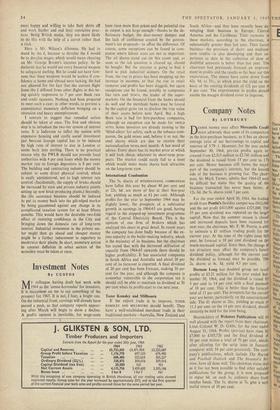Investment Notes
By CUSTOS
MY colleague having dealt last week with 1964 as the `annus horrendus' for investors, it is incumbent on me to say something of the prospect fot 1965. It is not, I fear, a bright one. On the industrial front, earnings will already have passed a peak, so that company reports appear- ing after March will begin to show a decline. A profits squeeze is inevitable, for wage-costs have risen more than prices and the potential rise in output is not large enough—thanks to the de- flationary budget, the dear-money damper and the lack of confidence created by the govern- ment's tax proposals—to offset the difference. Of course, some exceptions can be found in com- panies where labour costs are not so important. The oil shares stand out on this count and, as soon as the tax question is cleared up, should be bought. But the investor is going to find it hard to pick industrial winners. On the retail front, the rise in prices has been mopping up the increase in incomes, so that the • rise in retail turnover and profits has been sluggish, but again exceptions can be found, notably in companies like Gus and TESCO, the leader of the super- markets. On the financial front the banks should do well and the merchant banks may be forced by the capital gains tax to disclose the true value of their assets before next April. But a high Bank rate is bad for hire-purchase companies, although an exception can be made for ANGL2 AUTO. Some investors are already turning to the `blind-alleys' for safety, such as the tobacco com- panies, the gold mines and, believe it or not, the steel shares which are due to receive their nationalisation terms next month. A last word of advice. Every share has its market price at which it will look cheap, whatever its short-term pros- pects. The market could easily fall to a level which would make many shares look attractive on the long-term view.
International Combustion
The 5s. shares of INTERNATIONAL COMBUSTION have fallen this year by about 40 per cent and at 22s. 6d. are more or less at their five-year low, yielding as much as 6+ per cent. Although profits 'for the year to September 1964 may be slightly lower, the prospects of a substantial growth in earnings in 1964-65 are good, having regard to the stepped-up investment programme of the Central Electricity Board. This is the opinion of one firm of brokers which has analysed this share in great detail. In recent years the company has done badly because of the ex- cess capacity in the boiler-making industry, which is the mainstay of its business, but the chairman has stated that with the increased utilisation of capacity from 1964-65 onwards there should be higher profitability. It has associated companies in South Africa and Australia and about 20 per cent of its turnover is exported. A final dividend of 20 per cent has been forecast, making 30 per cent for the year, and although the company is somewhat vulnerable to the corporation tax it should still be able to maintain its dividend at 30 per cent when its profits start to rise next year.
Tozer Kemsley and Millbourn
If the export trade is to improve, TOZER KEMSLEY AND MILLBOURN should benefit. They have a well-established merchant trade in their traditional markets—Australia, New Zealand and
South Africa—and they have recently been de- veloping their business in Europe, Central America and the Caribbean. Their turnover in these markets, according to the chairman, is substantially greater than last year. Their factor business—the provision of short- and medium- term credits—is also developing and their ex- perience to date in the collection of slow or doubtful accounts is better than last year. The chairman had previously forecast an improve- ment in profits and the results so far bear out this expectation. The shares have come down from 42s. 9d. to 31s., at which price the yield on the basis of the existing dividends of 124 per cent is .8 per cent. The improvement in profits should enable the meagre dividend cover to improve.






























 Previous page
Previous page